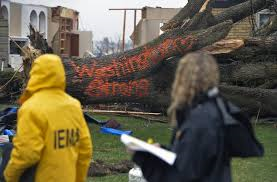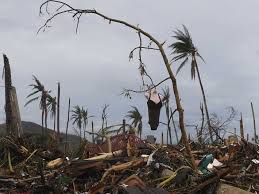Last week when I was at a meeting I received word that the family of one of the members of the Board for International Mission had lost their home in the tornado that hit Washington, Illinois. He said that they were thankful that all they lost was their house. Today I heard on the news that Thanksgiving eve is notable for two reasons – travel, about 43 million of us will take off and travel at least 50 miles to be somewhere else, and partying.
I remember reacting angrily a few years ago at the news reporting on Thanksgiving. while I was busy stuffing my face and watching football there would be news reports about the hungry and homeless with the subtext that I shouldn’t be enjoying the day because it was my fault that they were hungry and homeless. An interesting study would also be the frequency of the stories when different political parties are in charge, but I digress. I don’t usually do this – I want everyone to be thankful and enjoy the day, but when I read this I had to share and I politely ask you to think about and pray about it too.
In a deeply personal narrative, the Rev. Steve Schave, associate executive director, LCMS Office of International Mission, offers a powerful witness to the calling we have as children of God to proclaim the Gospel and share the hope that we have in Christ Jesus, particularly in the face of a devastating event. Schave recently returned from a week in the Philippines, where he served as a member of the LCMS advance disaster response team responding to a call for assistance from our partner church, the Lutheran Church in the Philippines, in the wake of Typhoon Haiyan. Below is that narrative.
Mud, blood, tears . . . and hope.
I have served as an inner city pastor acquainted with crime and violence. I have served as a hospital chaplain familiar with trauma and death. I have served as a prison minister experiencing some pretty rough criminal elements. I have also served as a disaster relief coordinator witnessing devastation and grief. But nothing could have prepared me for what I would witness in the Philippines. The chaos, the mourning, the whole-scale destruction and desperate need. I went to represent our Synod, to offer our support and concern to our partner church there and to ensure smooth operations were maintained with our Manila office, our missionaries from the Asia Pacific region and our Mercy Operations team. I thought our team might be the equivalent of a knight in shining armor coming to the rescue. But once we found ourselves in the areas that were affected the most, surrounded by endless cries for help and insurmountable unmet basic needs, all I could feel was empathy . . . and pure, unadulterated helplessness.
Surely I would be a changed man, fully aware of the weakness of our human frailty. When I sit at the dinner table, will the memory of a family kitchen turned watery grave be etched in my memory? When I embrace my children upon my return, will I hear the echoes of the father’s account of his children being snatched from his arms by wind and wave? When I walk down the halls of my kids’ school, will I see the faces of hundreds of beautiful children who lined the streets with their hands out begging for food to survive? Will I ever forget the smell of death that enveloped me, the sights of family members sifting through rubble to find the ones they love and the body bags placed on the curb among the debris to be taken away? Can I process the sheer force with which the inescapable beauty of a garden paradise was now covered by a thick layer of the deadly effect of sin, where so many were still reeling from the effects of a recent earthquake? Filled with images of God’s wrath and judgment, with doubts and fears, they were left to ask, “Why”? So much suffering: where to begin in this land of mud, blood and tears? A whole island ravaged: where to begin?
Where else can we begin . . . but the cross? The place where God meets us in our suffering and sorrow. In unspeakable grief and indescribable devastation, we find the mercy of God in His Son, the crucified Christ. At the place of the skull on Mt. Calvary, a hill covered in mud, blood, sweat and tears, the anchor of God’s grace was dropped into the depths of hell and death. Even as I stood at what can only be described as the gates of hell, I could walk through the valley of the shadow of death and fear no evil.
A young man approached me as I stood at ground zero of Typhoon Yolanda (where they were still recovering bodies after 10 days with no end in sight). Seeing my clerical shirt and the crucifix that draped my neck, he asked me if I was a priest. I explained that I was a Lutheran pastor. Knowing then that I was one of Christ’s men, he asked, “Sir, would you come and pray for my dead.” I asked for the baptismal names of the three deceased family members, and while not expecting to be in this situation, I quickly turned to the end of the Commendation of the Dying in the Pastoral Care Companion that I had in hand. In this liturgy was a prayer of baptism, redemption, resurrection and a return to the garden paradise in a new creation restored. In this liturgy is the beautiful Nunc Dimittis that we so often sing after communion along with saints and angels. With it we announce to the world and the devil himself that we have received Christ’s body and blood, and we have seen our salvation and are ready to depart from this world in peace. We await the great reunion that is to come with all those who died in the faith before us. Those whom, even though it might seem they slipped through our fingers, we will once again embrace.
At one of the churches we visited, the nearby residents took refuge beneath the altar when the storms hit. Indeed, when we find our refuge at the altar, there is no tempest or whirlwind that can sweep us away because our hope is anchored in Christ. In Him alone are we ready to face the Son of Justice who sits on the throne of judgment. On Good Friday, the earth shook and the waters poured, as Christ bore the full wrath of God against sin. As a result, we can stand at the gates of death and hell, but they will not prevail. We will storm the gates, bringing Christ with us.
So here we find our place to begin on a ravaged island with that which is in most scarce supply — hope. Working with our missionaries, our church partners and our disaster response team, we will give not only shelter, food and water, but the water that gives eternal life — water that allows us to never thirst. We will give the food and drink that offer forgiveness, life and salvation that we would hunger no more. We will give shelter that is not only temporary, but an eternal dwelling place. We will give the Good News of Christ crucified and risen again and the message of how God can use all things for good. Yes, this may have been the strongest recorded typhoon in which 7 feet of water passed through the streets in front of one of our partner churches, carrying homes and bodies, but when the Word of God is attached to the water of Baptism, there is no stronger force on this earth. With all the strength of Noah’s flood or the walls of the parted Red Sea that came crashing down, the water of Baptism drowns our sinful nature and rescues us from death and the devil. It connects us to Christ’s death and resurrection, so that like Lazarus, Christ will one day call us from our tombs; the smell of death will no longer be able to cling to us, but only the sweet aroma of eternal life.
Let there be no doubt, brothers and sisters in Christ, there is hope in the Philippines. We saw it in the smiling faces of the brothers and sisters in the faith who were there. We heard it when they spoke of how God gave His only Son, and if that was all they had, it would be enough. We shared in it when we sat at their tables, and they gave to us from what little they had. We participated in it as we gathered together around God’s Word. There is hope, and you, too, can be a part of it. You can help your Synod to work with the Lutheran Church in the Philippines to pick up the pieces of so many shattered lives and lost livelihoods. With the right team in place, your Synod was able to get to the most affected areas bringing the most needed resources and spiritual care to our brothers and sisters in the Philippines. This is what the body of Christ does–it bears one another’s burdens, it suffers together, it brings relief and it comforts. This is what God does–He turns panic into fervent hope, and He turns chaos, violence and danger into order, peace and safety. Yes, even from out of death, God brings new life in the most storm-torn nation . . . AND YOU CAN HELP.
Prayerfully consider joining with your baptized brothers and sisters in Christ to share the baptized hope that is in Christ Jesus. You can make a Giving Tuesday (Dec. 3) gift to the LCMS Global Mission fund athttp://www.lcms.org/givenow/givingtuesday. To share hope with typhoon victims in the Philippines or tornado victims in Illinois, visit www.lcms.org/disaster. Together as the Synod, we can make a difference.
– Rev. Steve Schave
Reposted from http://wmltblog.org/



